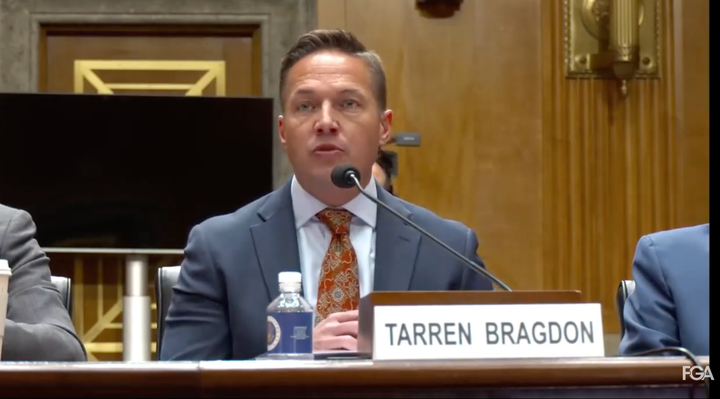The biotech industry is booming in Massachusetts, and pharmaceutical companies are spending millions on lobbying state government every year. But some pharmaceutical companies also have an arrangement that could give their lobbying an extra boost: consulting contracts with the state’s top health official’s spouse, something ethics experts say violates the state’s conflict of interest statute.
Since 2015, the Massachusetts Department of Public Health (DPH) has been led by Commissioner Monica Bharel, an appointee of Republican Gov. Charlie Baker. Bharel’s husband, Sushrut Waikar, is chief of the section of nephrology at Brigham and Women’s Hospital in Boston and an associate professor at Harvard Medical School.
But Waikar also has another line of work. According to Sludge’s review of Bharel’s annual statements of financial interest, Waikar has worked as a consultant for a wide range of health care interests with business before the Bharel’s department, including drugmaker GlaxoSmithKline, blood supply company Cerus, opioid manufacturer Janssen Pharmaceuticals, and CVS Health, which owns health insurance company Aetna, pharmacy benefits manager Caremark, and a chain of retail pharmacies.
In multiple instances, Waikar’s consulting clients have attempted to influence the DPH’s regulatory rulemakings by submitting public comments. Sludge reviewed dockets and minutes of department meetings and found that in several cases Bharel took official actions, including voting, on rulemakings to which her husband’s consulting clients had submitted comments.
The state’s conflict of interest law prohibits state employees from participating in matters in which they or their partners have a financial interest. The law sets forth “a fine of not more than $10,000, or by imprisonment in the state prison for not more than 5 years” for individuals who are found to have violated it.
As public health commissioner, Bharel oversees all bureaus and offices within the department and serves as chair of the Public Health Council, which, according to its website, “promulgates rules and regulations, holds public hearings, approves certain appointments and Determination of Need applications.”
In 2016, pharmaceutical giant GlaxoSmithKline submitted multiple comments to the Public Health Council in support of vaccines requirements. Waikar worked as a consultant for GlaxoSmithKline in 2016, and again in 2018.
In an October 2016 comment to the Public Health Council regarding a hospital licensure rulemaking, GlaxoSmithKline put its support behind a proposal to require hospitals to offer influenza vaccines to all patients over the age of 65. The company also submitted comments that year regarding a Public Health Council regulation that amended vaccine requirements for children attending schools in Massachusetts. The regulatory amendment was discussed at a March meeting of the Public Health Council at which Bharel was present and voted on by the council in December of that year. Bharel voted in favor of the proposal, according to meeting minutes.
The regulatory language that was approved by the Public Health Council incorporates edits that GlaxoSmithKline had requested in its comment, including swapping out a list of specific vaccines with a requirement to be in compliance with recommendations developed jointly between the state and the federal government.

Also in 2016, Waikar was working as a consultant for several companies that are members of the Massachusetts Biotechnology Council (MassBio), a pharmaceutical industry lobbying group. That year, DPH undertook a review of regulations as required by an executive order from Gov. Baker, and MassBio submitted a comment to the process calling on the state to help its member companies acquire licenses to sell their drugs in other states.
“Dear Commissioner Bharel, In this testimony, we describe a matter of growing concern for many of our member pharmaceutical manufacturers that are having difficulties obtaining necessary licenses for the distribution of their drug products in states outside of the Commonwealth,” MassBio wrote in comments submitted in August 2016. Waikar’s consulting clients that year included MassBio members Abbvie, Astellas, GlaxoSmithKline, Merck, Pfizer, and Takeda, according to Sludge’ review of Bharel’s 2016 financial disclosure.
DPH determined that MassBio’s regulatory request needed legislative approval, and in 2018 the legislature included the requested language in a budget bill and kicked the process back to Bharel’s department for promulgation. In a May 2019 Public Health Council meeting, Bharel called for a motion to approve the regulation and promulgate language that closely resembles the wording of the proposal put forth by MassBio in its 2016 comment. The resulting law makes it easier for Massachusetts-based pharma companies that outsource drug production to obtain home state drug manufacturer registration, permitting them to sell in states that require this registration.
Government ethics expert Craig Holman of Public Citizen told Sludge that Bharel’s participation in these matters appears to constitute a clear violation of the state’s ethics laws.
“If Bharel participated in the rulemaking process, this would constitute a direct and substantial violation of the conflict of interest statute,” Homan said. “Waikar has a financial interest at stake in several major pharmaceutical and health care companies that had business pending before Bharel’s department. These are major companies and so it is reasonable to assume that Waikar’s financial interests are significant.”
Another of Waikar’s consulting clients submitted regulatory comments to the same docket. In a 4-page document addressed to DPH and the Board of Registration in Pharmacy, CVS Health requested several changes to the department’s proposal. For example, the company opposed a provision that would require pharmacists to notify patients if they had acquired vaccines free of charge from the state, and it requested tweaks to ensure that medication orders do not have to be in the form of written documents. In 2016, Waker was a consultant for CVS’s prescription benefit management subsidiary, Caremark. In 2017 and 2018, Bharel’s financial disclosures indicate that he consulted for CVS.
The rulemaking was approved by the Public Health Council in a March 2017 meeting at which Bharel asked for a motion to approve the proposal, according to the minutes.
In 2018, drug companies Pfizer and Otsuka, which Waikar had consulted for in 2016, submitted comments to a DPH rulemaking that was approved by the Public Health Council in May 2019. Minutes indicate that Bharel was present at the meeting and called forward a motion for the council to approve the regulations.
In several cases, Waikar’s consulting clients have submitted comments to rulemakings conducted by the Board of Registration in Pharmacy, which Bharel oversees but is not a member of. Clients that submitted regulatory comments to the Board of Registration in Pharmacy include GE Healthcare, Asteres, and CVS Health.
State law requires Bharel to disclose any conflicts of interest and either recuse herself or get a waiver from her appointing official. Sludge obtained Bharel’s ethics and conflict of interest disclosures through a freedom of information request and, in reviewing the documents, did not identify any disclosures that pertained to her husband’s consulting work.
Bharel did not respond to Sludge’s request for comment on these apparent conflicts of interest. Instead, she forwarded our inquiry to a DPH spokesperson who reviewed our findings and stated that “a pharmaceutical company [did not] submit a comment that created an obligation requiring Commissioner Bharel to file a disclosure with the State Ethics Commission.”
Read more from Sludge:



